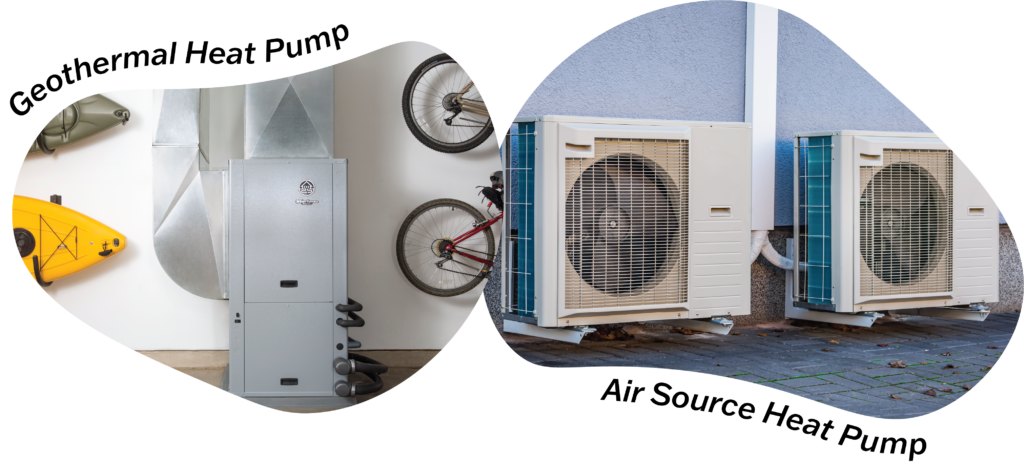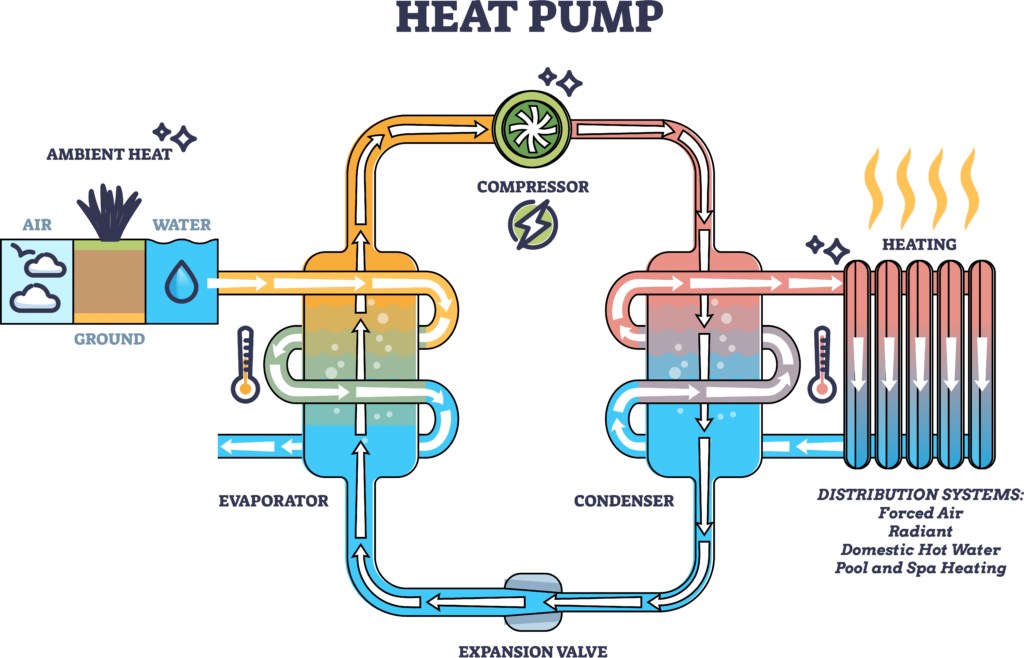
As we strive for more efficient and environmentally friendly ways to heat and cool our homes, homeowners find themselves comparing Air Source Heat Pump Systems and Geothermal Heat Pump Systems in consideration for when their fossil fuel heating system and AC needs replacement. Both air source heat pumps and geothermal heat pumps have their merits, but when it comes to long-term efficiency and sustainability, geothermal heat pumps often come out on top. Let’s dive into the details of these systems, understand heat pumps vs geothermal, and see why a ground source heat pump might be the best choice for your home.
What is a Heat Pump?

A heat pump is a device that transfers heat from one place to another. During the winter, it extracts heat from the available ambient temperature and moves it indoors to heat your home. In the summer, it does the reverse, taking heat from inside your home and expelling it to cool your space. This process is highly efficient because it moves heat rather than generating it through burning fossil fuels. These systems use renewable energy to operate. Learn more about how these systems are renewable here
There are two main types of heat pumps to heat and cool your home: Air Source and Ground Source (also known as Geothermal).
Air Source Heat Pumps

An air source heat pump (ASHP or Air to Air Heat Pump) pulls heat from the outside air. They are widely used because they are easy to install and can have a lower upfront cost compared to geothermal systems. However, their efficiency can drop significantly in extremely cold or hot climates because they rely on the outside air temperature. This drop in efficiency increases these system’s operating costs.
Ground Source Heat Pumps (Geothermal Heat Pumps)

A ground source heat pump, often referred to as a geothermal heat pump, taps into the stable temperatures found below the earth’s surface. Unlike the air, which can vary dramatically in temperature, the ground maintains a consistent temperature year-round. This allows geothermal systems to operate more efficiently and consistently regardless of the season.
How Do Geothermal Heat Pumps Work?
Geothermal heat pumps get most of their heat from the ground. They use a series of pipes buried underground, called a ground loop, to exchange heat with the earth. This ground loop can be installed horizontally or vertically, depending on the available space and soil conditions. The system circulates a water-based solution through these pipes to absorb heat from the ground in the winter and disperse heat back into the ground in the summer.
Geothermal Heat Pump vs. Air Source Heat Pump
When comparing a geothermal heat pump vs. a heat pump, several factors stand out. Geothermal systems typically have higher efficiency ratings because they rely on the relatively constant underground temperatures. This leads to lower operating costs over time. While the initial installation cost of a geothermal heat pump can be higher, the long-term savings and increased efficiency often make it a more cost-effective choice.
Efficiency
Geothermal heat pump systems rely on the stable ground temperatures to provide heating and cooling. This stability means they can achieve efficiency levels of 300% to 550%, compared to air source heat pumps, which typically range from 175% to 250%. This makes geothermal systems particularly attractive in regions with extreme temperatures.
Environmental Impact
Geothermal heat pumps are one of the most environmentally friendly heating and cooling options available. They use renewable geothermal heat from the earth and a small amount of electricity to operate. In contrast, air source heat pumps, while more eco-friendly than traditional heating systems, rely on 2x the electricity that a geothermal heat pump does.
Longevity and Maintenance
Geothermal systems generally have a longer lifespan than air source heat pumps. The underground components of a geothermal system can last 50 years or more, while the heat pump itself typically lasts about 25 years. Air source heat pumps usually have a lifespan of 15 to 20 years. Additionally, geothermal systems require less maintenance since the ground loop is protected from the elements. To learn more about the lifecycle cost and longevity of a geothermal heat pump system, check out our blog article: Geothermal Installation Cost
Cost Considerations: Heat Pump vs. Geothermal Cost
When evaluating heat pump vs. geothermal cost, it’s important to look beyond the initial installation expenses. Although geothermal systems can be more expensive to install due to the ground loop, they offer significant savings on energy bills over time. The higher efficiency of geothermal systems means lower operating costs, which can lead to substantial savings in the long run.
Geothermal Heat Pump System Components
A geothermal heat pump system consists of three main components: the ground loop, the heat pump unit, and the distribution system.
- Ground Loop: This is the network of pipes buried in the ground that facilitates heat exchange with the earth.
- Heat Pump Unit: This unit transfers heat between the ground loop and the home’s heating and cooling distribution system.
- Distribution System: This can be traditional ductwork, radiant floor heating, or other methods of distributing heated or cooled air throughout the home.
Geothermal Heat Pump: Is it a Furnace or Air Conditioner?
A geothermal heat pump furnace combines the functions of a furnace and an air conditioner, making it a versatile and efficient option for home heating and cooling.
Air Source vs. Ground Source Heat Pump
The debate of air source vs. ground source heat pump often centers around installation costs, efficiency, and climate suitability. While air source heat pumps are less expensive to install and can work well in moderate climates, ground source heat pumps offer superior efficiency and performance, especially in areas with extreme temperatures like Western New York.
Are All Heat Pumps Geothermal?
Not all heat pumps are geothermal. Heat pumps can be categorized as air source or ground source (geothermal). Air source heat pumps transfer heat between the air and your home, while geothermal heat pumps use the stable temperatures of the ground for heat exchange.
Geothermal vs. Air Source Heat Pump: Which is Better?
Choosing between a geothermal vs. air source heat pump depends on various factors, including your budget, climate, and long-term energy goals. Geothermal heat pumps are generally more efficient and environmentally friendly, making them a better choice for those looking to minimize their carbon footprint and energy bills.
Conclusion: The Case for Ground Source Heat Pumps
In the battle of air source heat pumps vs. geothermal systems, ground source heat pumps clearly have the upper hand in terms of efficiency, environmental impact, and long-term savings. While the initial installation cost can be higher, the benefits of a geothermal heat pump system far outweigh the initial investment. For homeowners looking to make a sustainable and cost-effective choice, a geothermal heat pump is the way to go.
Key Takeaways
- Efficiency: Geothermal heat pumps are more efficient than air source heat pumps, especially in extreme climates.
- Environmental Impact: Geothermal systems have a lower carbon footprint and use renewable energy from the earth.
- Longevity: Geothermal systems have a longer lifespan and require less maintenance.
- Cost: Although geothermal systems have higher upfront costs, their long-term savings make them more cost-effective. Available installation incentives reduce the cost to make the systems price comparable to air source heat pumps.
By choosing a geothermal heat pump, you’re investing in a technology that offers unparalleled efficiency and sustainability, making it a wise choice for the future of home heating and cooling.
COMMENTS